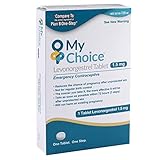Different Ways to Prevent Pregnancy: A Comprehensive Guide
The Ultimate Guide to Preventing Pregnancy: Needs and Benefits.
In today's world, pregnancy prevention has become a crucial topic for many people. Whether it's due to personal choices, financial considerations, or health concerns, there are numerous benefits to taking steps to prevent pregnancy. From avoiding the physical and emotional strains of pregnancy to maintaining control over one's reproductive health, pregnancy prevention can provide a range of advantages. In this ultimate guide, we will explore the different methods of pregnancy prevention available, the benefits and drawbacks of each, and how to choose the method that's right for you. Whether you're looking to prevent pregnancy for the short term or the long term, this guide has everything you need to know to make informed decisions about your reproductive health.

Hormonal Methods for Preventing Pregnancy: Overview
Hormonal methods of pregnancy prevention are among the most popular and effective forms of birth control available today. These methods work by using synthetic hormones to prevent ovulation or thicken cervical mucus, making it more difficult for sperm to reach and fertilize an egg. Hormonal methods of pregnancy prevention include several options that are both safe and effective, making them a popular choice for many individuals.
One of the most commonly used hormonal methods of pregnancy prevention is the birth control pill, which contains synthetic versions of the hormones oestrogen and progestin. The pill is taken daily and is over 99% effective at preventing pregnancy when used correctly. Other hormonal options include the patch, which is worn on the skin and releases hormones into the bloodstream, and the vaginal ring, which is inserted into the vagina and slowly releases hormones over the course of three weeks.
Hormonal methods of pregnancy prevention offer several benefits beyond their effectiveness. They can also help regulate menstrual cycles, reduce the risk of certain cancers, and relieve symptoms of conditions such as endometriosis and polycystic ovary syndrome (PCOS).
It's important to note that hormonal methods of pregnancy prevention may not be suitable for everyone, as they can have side effects such as headaches, mood changes, and weight gain. It's also essential to discuss any concerns or health conditions with a healthcare provider before starting hormonal birth control
Barrier or Non-Hormonal Methods of Pregnancy Prevention
Non-hormonal methods of pregnancy prevention are an alternatives for individuals who prefer not to use hormonal contraception. These methods work by preventing the sperm from fertilizing the egg, without the use of synthetic hormones. Here are some of the most commonly used non-hormonal methods of pregnancy prevention:
-
Barrier Methods - Barrier methods of pregnancy prevention, such as condoms and diaphragms, physically prevent the sperm from reaching the egg. Condoms, made of latex or polyurethane, are worn over the penis during intercourse to prevent the sperm from entering the vagina. Diaphragms are a small, flexible cup inserted into the vagina to cover the cervix, preventing the sperm from entering the uterus.
-
Copper Intrauterine Device (IUD) - The copper IUD is a small, T-shaped device that is inserted into the uterus by a healthcare provider. It works by creating an inflammatory response in the uterus, which prevents fertilization and implantation of the egg. The copper IUD can prevent pregnancy for up to 10 years.
-
Natural Family Planning - Natural family planning, also known as fertility awareness, involves tracking the menstrual cycle to determine the fertile window when ovulation occurs. During this time, couples can choose to abstain from sex or use barrier methods of contraception to prevent pregnancy.
-
Sterilization - Sterilization is a permanent form of contraception that involves surgically blocking the fallopian tubes in women or the vas deferens in men, preventing the sperm from reaching the egg. This method is considered irreversible and should only be considered by individuals who are sure they do not want to have children in the future.
Non-hormonal methods of pregnancy prevention have their own set of benefits and drawbacks, and it's important to work with a healthcare provider to choose the method that best fits one's individual needs and lifestyle. It's also important to note that no method of contraception is 100% effective, and some methods, such as natural family planning, require a high degree of commitment and accuracy to be effective.
Types of Hormonal Pregnancy Prevention Method.
-
Birth Control Pills - Also known as "the pill," are a type of hormonal contraceptive that contains synthetic versions of the hormones oestrogen and progestin. These hormones prevent ovulation and thicken the cervical mucus, making it more difficult for sperm to reach and fertilize an egg. There are two types of birth control pills - combination pills that contain both oestrogen and progestin, and progestin-only pills. Combination pills are the most commonly used and are taken daily for 21 days, followed by a seven-day break. Progestin-only pills must be taken at the same time every day without a break.
-
The Patch - The patch is a small, thin adhesive patch that is placed on the skin and releases synthetic hormones into the bloodstream. The patch contains both oestrogen and progestin and is changed once a week for three weeks, followed by a week without a patch.
-
The Vaginal Ring - The vaginal ring is a small, flexible ring that is inserted into the vagina and slowly releases synthetic hormones over the course of three weeks. It contains both oestrogen and progestin and is removed for one week before a new ring is inserted.
-
The Shot - The shot, also known as Depo-Provera, is an injection of synthetic progestin given every three months. It prevents ovulation and thickens the cervical mucus, making it more difficult for sperm to reach and fertilize an egg.
-
The Implant - The implant, also known as Nexplanon, is a small, flexible rod inserted under the skin in the upper arm. It releases synthetic progestin and can prevent pregnancy for up to three years.
Abstinence As A Powerful Method of Pregnancy Control
The practice of abstaining from sexual activity, commonly known as abstinence, is a time-tested and highly effective approach to pregnancy prevention. It is the only form of birth control that offers complete protection against both pregnancy and sexually transmitted infections, but it requires considerable self-discipline and commitment.
Abstinence is a natural and non-invasive method of birth control that does not involve the use of hormones or devices, making it an attractive option for individuals who want to avoid the potential side effects of other forms of birth control. It empowers individuals to make informed decisions about their reproductive health by allowing them to choose when and with whom they engage in sexual activity.
While practicing abstinence may require significant effort and restraint, it can offer significant benefits for individuals who are committed to their sexual health. By abstaining from sexual activity, individuals can significantly reduce their risk of contracting sexually transmitted infections, which can have serious long-term health consequences.
In summary, abstinence is a powerful method of pregnancy prevention that can provide individuals with the peace of mind and security they need to make informed decisions about their sexual health. With careful consideration and commitment, abstinence can be a highly effective tool for taking control of one's reproductive health.

Used any Before?
Which Pregnancy Prevention Method Have You Ever Used or Considered to Use?
© 2012 Deborah Anifowose






